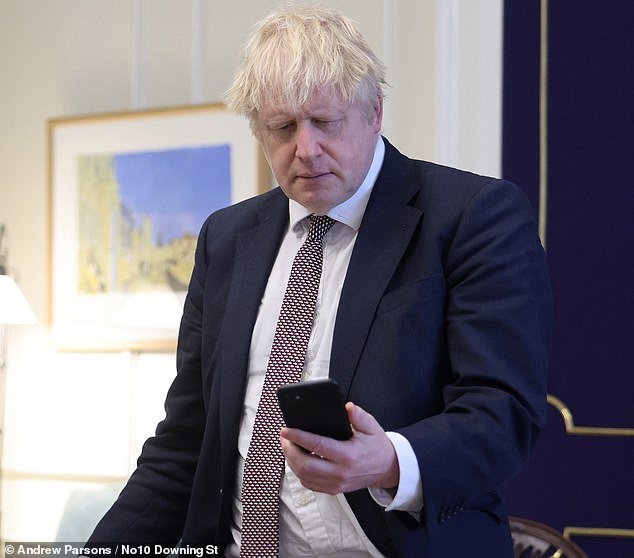British pranksters have taken full advantage of access to Boris Johnson’s mobile number, bombarding him with joke texts and calls after it emerged the digits were available online for the last 15 years.
Popular gossip newsletter Popbitch last night gave its readers clues on how to find the Prime Minister’s number, pointing them to a press release from his time as MP for Henley in 2006.
The number, which the PM hasn’t changed in the decade and a half since, is written on the bottom of the press release.
Britons have now taken to social media to share how they have used the number to send a number of joke messages.
Popular gossip newsletter Popbitch last night gave its readers clues on how to find the Prime Minister’s number, pointing them to a press release from his time as MP for Henley in 2006
One shared a screenshot of a text which said: ‘Yo Boris. Any chance of getting one of those squiffy contracts? Ta.’
The tweet added: ‘I haven’t had a reply from my text yet. I’d really like to get on the gravy train before the money runs out.’
Another joked: ‘What have you sent to Boris Johnson’s number? I reckon MI5 will have to comb through every message…. I WhatsApped him a load of screaming opossums.’
A third said he had sent the Prime Minister a ‘d*** pic’, posting the famous image of Mr Johnson trapped on a zipwire.
A fourth pledged: I’m about to personally lobby our PM to increase our budget for scientific research…wish me luck.’
The revelation comes just days after it was revealed that Mr Johnson refused to change his number, despite concerns that he was constantly being approached for help because it is so widely known.
Cabinet Secretary Simon Case is said to have raised the issue with the PM last year, telling him he was being asked for help by MPs, lobbyists and others in the business world so often because his number was too widely known.
Downing Street declined to comment on the report and attempts to call the number on Thursday night were met with an automated message saying the phone was ‘switched off’ and an invitation to ‘please try later or send a text’.
This morning Lord Ricketts, former UK National Security Adviser and former chair of the Intelligence Committee outlined the possible security implications of Mr Johnson’s number being so readily available.
‘It does matter because access to the Prime Minister is a very valuable commodity and if this same mobile phone number has been used for 15 or 20 years then hundreds if not thousands of people must have access to it,’ he told BBC Radio Four’s Today programme.
‘That gives them privileged access to someone who is no longer the MP for Henley, but the Prime Minister of the country.




‘There could be [security implications] because if his mobile phone number has been that widely available, you can’t rule out that others who you really don’t want to have his number like hostile states with sophisticated cyber capabilities or criminal gangs might have it as well.
‘That’s the risk you run, I think, if you don’t take care of your digital security in the same way as your physical security when Prime Minister.
‘I would have thought it’s an elementary security precaution [to change the number], just as you have to accept the inconvenience of a lot of restrictions on your physical access.
‘You can’t walk out through the gate for a cup of coffee without police protection, or you can’t have people casually drop into your office because you knew them 15 years ago.
‘But if they’ve got your phone number they’ve got the equivalent of being able to walk into your office while you’re Prime Minister so I think Prime Ministers have to accept a degree of inconvenience.’
Lord Ricketts insisted a personal mobile was needed for the Prime Minister to talk to friends and close associates but for all other communication, it needed to be run through Downing Street.
‘If you want the PM, you call the switchboard, they verify your identity to protect the Prime Minister from impersonators trying to produce false identities to talk to him, and then they put a private secretary on the line and put the Prime Minister through.’ he added.
‘In that way, there is a record and everyone is protected and you don’t have this valuable degree of access to the Prime Minister that comes from having his phone number.
‘I’m talking of the most senior politicians in sensitive positions whose phone conversations may include sensitive material, commercially sensitive material, people trying to lobby them for favours or tax advantages or talks for foreign leaders.
‘You have to accept as you do that you can’t just walk around and talk to anyone you like, equally you shouldn’t be in a position where anyone who once had your phone number can get to your when you’re Prime Minister.
‘That’s one of the inconveniences of being Prime Minister but it’s for their own sake and protection that access to them ought to be controlled and monitored so there can be no suspicion of favours asked for and done, all the kind of things we’re now seeing with the exchanges with James Dyson.
‘I think it’s in the Prime Minister’s own interest to be much more digitally secure than seems to be the case now.’
